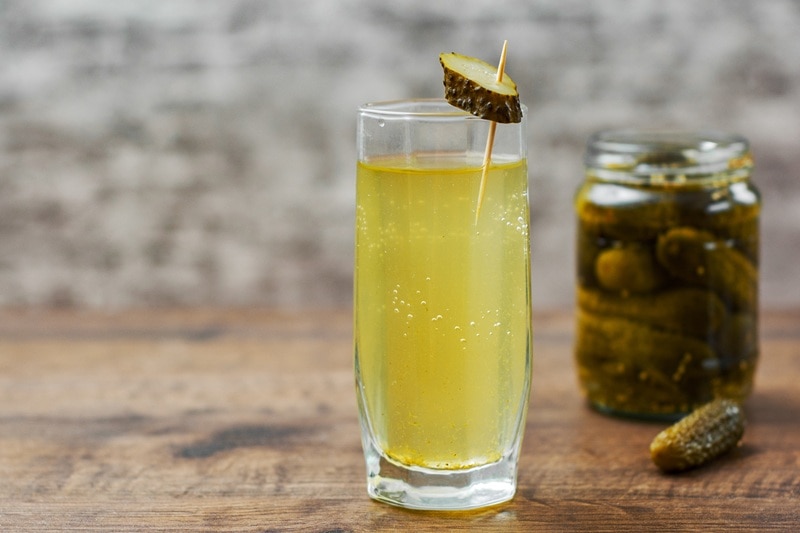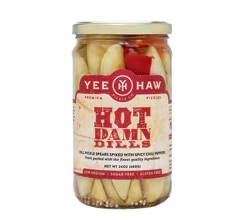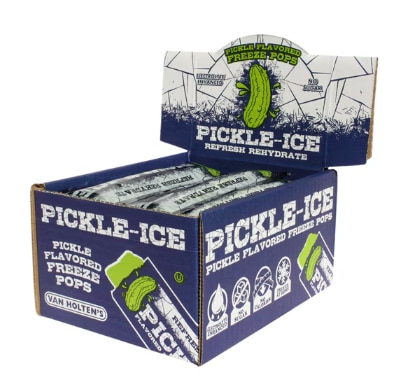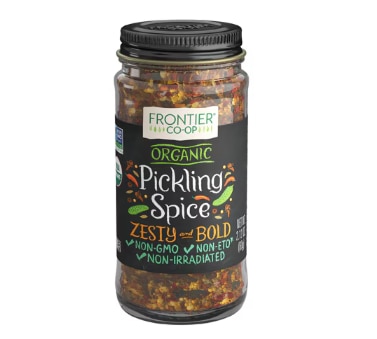What to do when you are “in a pickle?” Drink the juice! One of the year’s trendiest flavors is pickle, and it’s everywhere. Pickle juice has some surprising uses in the kitchen and may have some potential health benefits, but is pickle juice healthy? There’s limited and inconclusive research on pickle juice, but some potential health benefits have been identified. Read on for pickle juice nutrition information, potential benefits and how to incorporate more pickle juice into your diet.
Is Pickle Juice Good for You? A Nutrition Breakdown
Pickle juice or pickle brine is the liquid used to pickle cucumbers. It most commonly contains water, vinegar, salt, spices and/or herbs, but there is no standard recipe. This means the nutritional content of pickle juice will vary based on additional ingredients (like sugar), uses and brands. It is typically low or zero calories, provides no protein and low or no fat. Common nutrients found in pickle juice are vitamin C, potassium and often magnesium.
Nutrition for 8 oz serving of Pickle Juice Sports Drink per USDA:
Calories: 0
Total Fat: 0 g
Carbohydrate: 0 g
Potassium: 69.6 mg
Sodium: 821 mg (38% Daily Value)
Zinc: 6 mg (40% Daily Value)
Vitamin C: 18 mg (30% Daily Value)
Sodium content will vary across brands and serving size of pickle juice. However, it is generally considered a high-sodium liquid. Most pickle juice sports drinks, like the one above, provide around 1/3 of the daily recommended amount of sodium. Although our bodies need sodium, the average person in the United States consumes a significantly higher amount than the recommended daily intake of 2,300 mg per day for most adults.
Due to the high sodium content in pickle juice, it’s recommended to enjoy it in small or moderate amounts. If you have been advised to reduce your sodium intake by your physician due to high blood pressure, kidney disease or another condition, pickle juice may not be for you. Those with stomach ulcers, GERD (gastroesophageal reflux disease) and heartburn should also avoid acidic liquids like pickle juice.
Potential Health Benefits of Pickle Juice
Gut health
There are different methods used to preserve cucumbers. Natural fermentation uses a salt and water solution that creates a chemical reaction that promotes growth of beneficial bacteria. These pickles contain gut friendly probiotics. They can be found in the refrigerated section of your grocery store.
Most shelf stable pickles use vinegar for preservation and do not contain the same gut health benefits as naturally fermented pickles. However, studies suggest that the vinegar in pickle juice may improve insulin response and blood sugar after eating.
Probiotics are healthy bacteria that are found in fermented foods like pickles and pickle juice, kimchi, sauerkraut, yogurt, kombucha and kefir. These bacteria promote a healthy gut microbiome, which can support healthy digestion, provide immune support, and promote mental health and well-being.
Hydration & muscle cramp relief
Electrolytes, like sodium and potassium found in pickle juice, are essential for your body to maintain fluid balance and regulate nerve and muscle function. Electrolytes are lost through sweat and need to be replaced.
For light to moderate exercise, water is usually all that’s needed to rehydrate. If you are doing intense and/or long periods of exercise, pickle juice could be an alternative to higher sugar sports drinks for rehydration and electrolyte replacement.
Although more research is needed, a 2020 study suggests that pickle juice may be a quick solution for exercise induced muscle cramps. Due to the electrolytes in pickle juice, some also claim it’s a rehydration remedy after having one too many alcoholic beverages. However, there is no research to confirm currently.
Antioxidant benefits
Pickle juice contains vitamin C, which is an antioxidant. Antioxidants support the immune system and help your body fight free radicals, which are molecules that are associated with chronic conditions like heart disease and cancer. Remember that pickle juice is high in sodium and should be consumed in small to moderate amounts. Don’t rely on pickle juice alone for antioxidants. Incorporate a variety of fruits, vegetables, nuts and seeds, whole grains and legumes into your diet regularly for lower sodium antioxidant benefits.
How to Incorporate Pickle Juice in Your Diet
Pickle juice has a variety of uses. These include:
- Making a flavorful and tenderizing marinade for chicken, pork, beef or turkey
- Use as a vinegar alternative in salad dressings or dips
- Brighten up potato salad or egg salad with a dash
- Add a splash to creamy dishes like chowders, mashed potatoes and mac ‘n’ cheese as an enhancement.
- Use it in a cocktail for a savory flavor (think Bloody Mary or Dirty Martini)
- Make more pickles!
Get your creative (pickle) juices flowing with these varieties available at Vitacost:
- Woodstock Sliced Pickles Kosher Dill Organic
- Yee-Haw Pickle Co. No Frills Dills Premium Pickles
- Simple Truth Organic Kosher Dill Pickles Spears
- Tillen Farms Picked Baby Crispy Cucumbers
- Wickles Wicked Pickle Chips
Pickle juice is a fun flavor and may have some health benefits including supporting a healthy gut, hydration and muscle cramp relief, and antioxidant benefits. Further research is needed. Pickle juice can be used in a variety of ways to enhance your meals and of course, keep you on trend. However, the lip puckering liquid packs a sodium punch. Be mindful of enjoying in small amounts most often. For more expert nutrition guidance, the Kroger Health registered dietitians, our nutrition experts are available by appointment to help.




